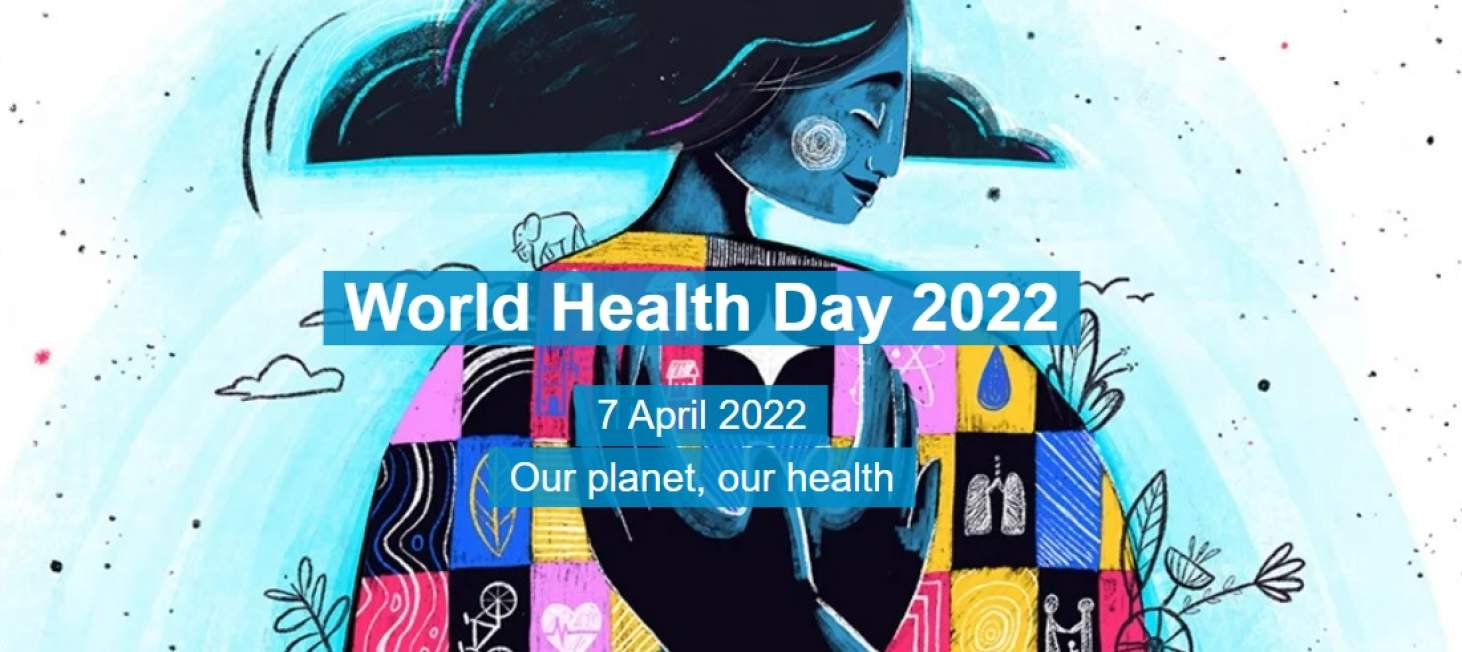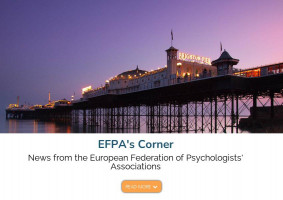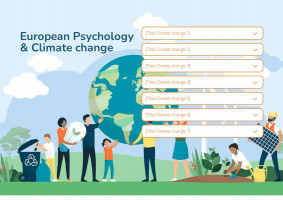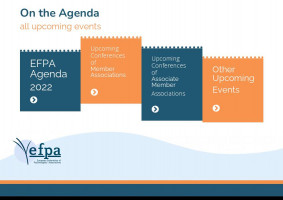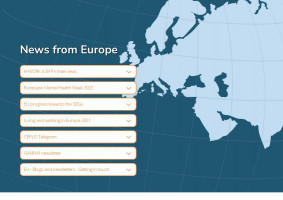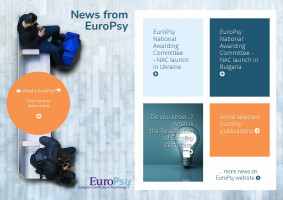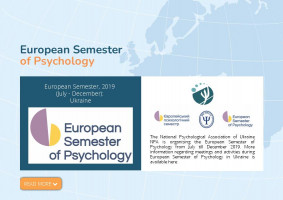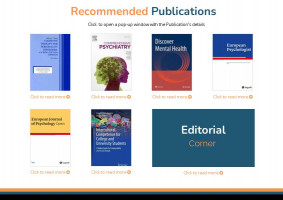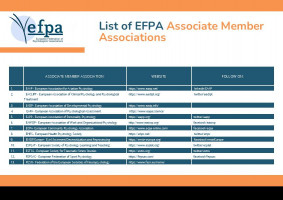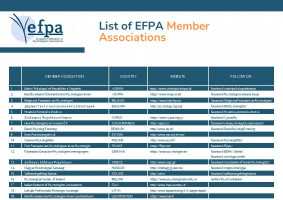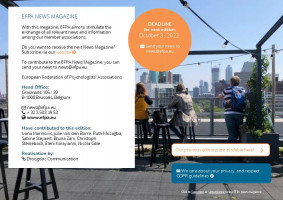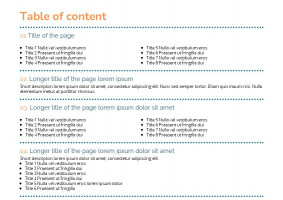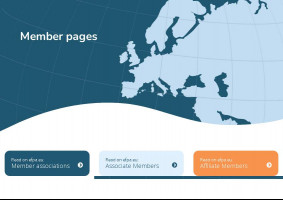
READ MORE
_w388_h484_1.jpg)
Dear colleagues,
There is certainly no shortage of challenges for psychology! Even though it seems that the situation around the pandemic has eased somewhat, we are still looking ahead to the autumn with worries. These worries are certainly surpassed at the moment by the consequences of the war in Ukraine.
In this magazine we report on the extraordinary General Assembly on the expulsion of the Russian Psychological Society. We see how strongly our groups and member associations are working for the people in Ukraine. EFPA wants to be a platform here so that good ideas are developed and effective help is provided, also for those colleagues in Russia who are committed to human rights and peace and we are grateful that some of our Member Associations are looking at how they can provide support to those colleagues.
Once again, this issue of our magazine highlights how strongly we are committed to promoting mental health in Europe. The European Mental Health Week, but also our various European research and cooperation projects, impressively demonstrate this. Furthermore, it becomes clear once again how strongly we as psychologists also oppose climate change. Again, the invitation to take in the information and share it with others is as valid as the invitation to join in and actively participate in achieving our strategic goals. The upcoming congress in Ljubljana will give us the opportunity to learn about and share in depth all these projects and concerns. But the European Congress is also an invitation to informal exchange and friendly dialogue. We are looking forward to it!
With all good wishes, yours,
Christoph Steinebach
EFPA President
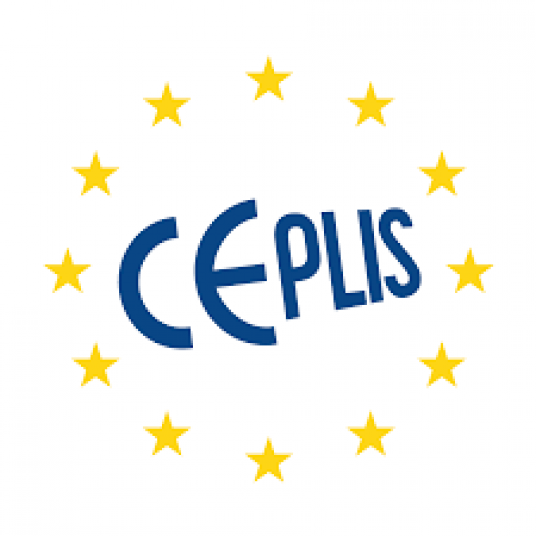
CEPLIS visits EFPA in Brussels
May 4, 2022, Brussels
EFPA Executive Council and Head Office were delighted to welcome Theo Koutroubas the CEO of CEPLIS (European Council of the Liberal Professions) to EFPA on 4 May, in Brussels. A wide-ranging discussion took place on professional frameworks for regulation and training, approaches to mutual recognition, advocacy with the European institutions, and blue sky thinking on the professional regulatory landscape of the future. Both parties found the conversation very helpful, and committed to close collaboration on areas of mutual interest especially related to the health professions and digitalisation
by Nicola Gale, EFPA Vice President
_w1462_h876_1.png)
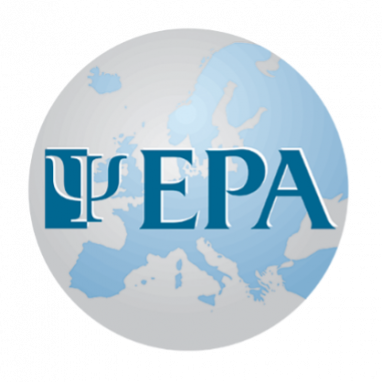
Growing the collaboration between EFPA and the European Psychiatric Association
By Eleni Karayianni, EFPA Executive Council member
The European Psychiatric Association (EPA) has become an EFPA strategic partner for different areas since the signing of an MOU in 2020. It is important to mention that EPA is an important partner of GAMIAN and the Mental Health Alliance to which EFPA is also partner. A report from a May 10th meeting organized by GAMIA and MHA can be found here.

-
More recently, EFPA and EPA have joined forces in advocating for a European Year of Mental Health, as also evidenced in EFPA strategic plan for 2021-2023. The focus of such a year would be to promote the adoption of a European mental health strategy emphasizing the importance of mental health for all, improving access to treatment and visibility of mental health issues by reducing the stigma surrounding it. A joint effort has led to a live joined session during EPA 2022 – the 30th European Congress of Psychiatry.
Read more - fold out The congress was titled “Linking Clinical Practice and Research for Better Mental Health Care in Europe” and was held on 4-7 June, 2022, in Budapest (virtual). It presented an opportunity to engage with state-of-the-art clinical tools, to expand the frontiers of research, explore innovative ideas for mental health care and prevention with a community of global professionals and stakeholders in the field of psychiatry and mental health care.The EPA EFPA joined symposium chaired by EFPA President, Prof. Dr. Christoph Steinebach and EPA President, Prof. Dr. Philip Gorwood provided an “Update on Resilience in Mental Health Diseases and Care Givers.” It took place on Sunday, June 5th.
Abstract: The resilience process received much interest in mental health, where you gain from negative experience instead of getting worst. The concept has now broadened to encompass all aspects of positively dealing with stressful situations. We all had a vivid and concrete experience with COVID-19 and associated seclusions, but patients with mental disorders were especially at stake for many reasons. The first speaker, Professor Andrea Fiorillo, the EPA treasurer, will describe how the Italian population managed, and how efficiently some subjects were able to cope. Stress is also part of life, especially of work life. Working in the field of mental health is very rewarding because of the importance of the demand and the pleasure to help those that need it most, but this work is also associated with negative aspects such as frustration and grief.
The president of EFPA will share with us why wellbeing in mental health workforce matters and how to develop it. Childhood trauma is much more invasive and deleterious source of stress, frequently constituting the ground for later mental health diseases. But once again, if detected early, and if efforts are really invested in prevention strategies, Doctor Eleni Karayianni will demonstrate that resilience is not only possible but also feasible. Because psychiatry is at the border of so many aspects, it is important to understand how our genes are involved in such resilience process. In this regard, we will have a nice example developed by Doctor Boris Chaumette of how our genetic material explains why some ultra-high-risk patients switch, or do not switch to schizophrenia.Both EPA and EFPA representatives agreed that the symposium was fruitful and a wonderful progress of the collaboration between the two organizations. There was a promise of continuing to promote cross-collaboration and connection between psychology and psychiatry in the future with further joined efforts and events.
_w816_h532_1.jpg)
_w816_h524_1.jpg)
EFPA SC Geropsychology
Statement about the situation of older persons in UkraineIn reply to a request from EFPAs Executive Council
Amidst the horrors of war in Ukraine there is one vulnerable group that has received little attention in the public so far. In 2021 there were more than 10 million people 60 years or older in Ukraine [1]. Many old and very old people are left behind while women and children are forced to flee their homes and healthy men under 60 are called to defend their country.
As Geropsychologists and psychology specialists for late life we see a need to draw attention to the plight of older persons and the issues that affect ageing individuals in the current Ukraine. It is our hope that an increased awareness of this matter will result in providing more psychological support, assistance, crisis intervention and other resources.
Although it has been heartening to see occasional media reports about the situation of older and disabled people in care homes and at home in Ukraine, media attention is drawn mainly to the impact on children and younger generations. We understand, that it requires a particular effort to include older people in mainstream reporting, and to ensure a balance between a positive narrative of their contribution and raising awareness of their situation and needs. More importantly, the support, health provision, and care of each and every old and very old individual in the Ukraine requires much effort and support in everyday life and needs to be secured in sustainable ways over the coming weeks, months, and perhaps years.-
Read more - Fold out text
Many older people serve in varied volunteer roles in this conflict, demonstrating resilience and strength in adversity. However, older people who require care and support are particularly vulnerable, often unable to leave, affected by lack of medicines and the inability of care givers to reach them with food or daily necessities of basic care. Many are also affected by direct or transgenerational war trauma stemming from the invasions of Ukraine during World War II, and while managing the psychological issues of declining health and dependency, the impact of perceiving to be a burden on family and society is heightened by experiences of powerlessness in the face of war related attacks and disruptions.
According to the United Kingdom Disasters Emergency Committee alliance of leading aid charities a survey of the eastern Donbas region, where fighting has been going on in places since 2014, indicated that more than 90% of the older population in this region need help to get food and cannot heat their homes in freezing conditions. Around 80% of older people report insufficient access to clean drinking water due to active shelling and airstrikes disrupting water supplies. More than a third of the older people are in urgent need of medication for chronic diseases, and three-quarters need hygiene items such as toothpaste, soap and toilet paper [2].
A 70-year old widow, Ekaterina, who now lives alone in her house in the eastern parts of Ukraine describes the situation as follows:
I am feeling very lonely. Because of the conflict, my daughters can't come to me. And I can't visit them, as I am afraid to abandon my house… The shelling is what worries me the most. What if they hit the house, and blast the windows, roof, doors out? Who will help me?” [3].
Living under such conditions is of course physically dangerous, but also extremely stressful and may result in despair, anxiety and psychological trauma among the older people left behind.Previously, research related to the Homeland war in Croatia (1991-1995), has stressed that it is extremely difficult for older people to cope with high levels of war-related stress [4].
Older persons, then in Croatia and now in Ukraine, usually have a lower educational status, their economic potential has diminished and many of them are widows or widowers. These facts anticipate the vulnerability of older adults and put them into a more unfavorable position regarding their capacity to cope with crises, compared to the younger adults. Their sources of social support, either emotional or material, that might help them cope with stress better, are also significantly reduced. Therefore, greater incidence of morbidity may be expected among the older persons, which makes them a special high-health-risk population. Those separated from their families and those completely alone will probably need the greatest assistance, psychological, social and medical [4].
EFPA Executive Council and Head Office have now set up a Psychological Support Hub regarding the war in Ukraine. This Hub focuses on sharing resources, exchanging information and best practices, and citing guidelines for provision of services during the war [5].
We highly recommend that the older people affected by the war be mentioned explicitly and be considered by the psychologists and other specialists who can offer help.-
References - Fold out text
References
[1] Statista (2022). Resident population of Ukraine as of January 1, 2021, by age group. Retrieved March 29from: https://www.statista.com/statistics/1006655/ukraine-population-by-age-group/
[2] Voice of America (2022). Elderly, Disabled Unable to Flee Ukraine War, Charities Say. Retrieved March 28th from: https://www.voanews.com/a/elderly-disabled-unable-to-flee-ukraine-war-charities-say/6478084.html
[3] Age International (2022). Ukraine conflict: Ekaterina's story. Retrieved March 29 from: https://www.ageinternational.org.uk/news-features/features/ukraine-crisis--ekaterinas-story/
[4] Havelka, M., Despot Lučanin, J. & Lučanin, D. (1995). Psychological reactions to war stressors among elderly displaced persons in Croatia. Croatian Medical Journal, 36(4), 262-265.
[5] EFPA (2022). EFPA Hub – Psychological Support for Ukraine. Retrieved March 29 from: https://efpa.magzmaker.com/efpa_hub_psychological_support_for_ukraine
EFPA’s Standing Committee on Geropsychology contributed their expertise to this statement.The Standing Committee on Geropsychology comprises representatives from across Europe working together on developing the evidence base of psychology related to ageing and translating it into practical implementation.Extra General Assembly of June 1, 2022 decides to expel Russian member association.
A meeting of EFPA’s General Assembly took place today, June 1, 2022, at which the Member Associations in General Assembly took the unanimous decision to expel the Russian Psychological Society from EFPA. The expulsion follows a request from the National Psychological Association of Ukraine for the Russian Psychological Society to be excluded from EFPA.
Please find EFPA statement here.
-
Consejo General de la Psicología de España (COP)
7 de abril, Día Mundial de la Salud: “Nuestro planeta, nuestra salud”
World Health Organization (WHO)
Environmental factors - including climate change - claim 13 million lives every year. Stop burning fossil fuels like oil, coal and natural gas for a #HealthierTomorrow
Welcome to Brighton!
While the world has been united in its battles against a global pandemic, we’ve also never been more divided. Issues of inequality driven by poverty, race, gender,climate crisis and many more have been catapulted to the fore, showing how volatile the world can be and raising questions of how society can come together and make change.
As individuals, we’re stronger together. When we are united, we have the power to influence and advocate for change. Psychology can be the driving force to unite and harness the power of community on a global scale.Using psychology, we can address the issues that have been magnified across the world. As one, we can build a fairer and more sustainable world. The British Psychological Society is proud to be hosting the European Congress of Psychology 2023 in Brighton.
We will bring together the leading experts in psychology from across Europe to discuss, debate and celebrate the impact of psychology on our communities and society. Submissions are now open and available, along with lots more information Call for reviewers
The ECP 2023 Scientific Committee invites you to register as a reviewer for the ECP 2023 congress, no later than June 30, 2022. You can sign up as a reviewer in less than 5 minutes here
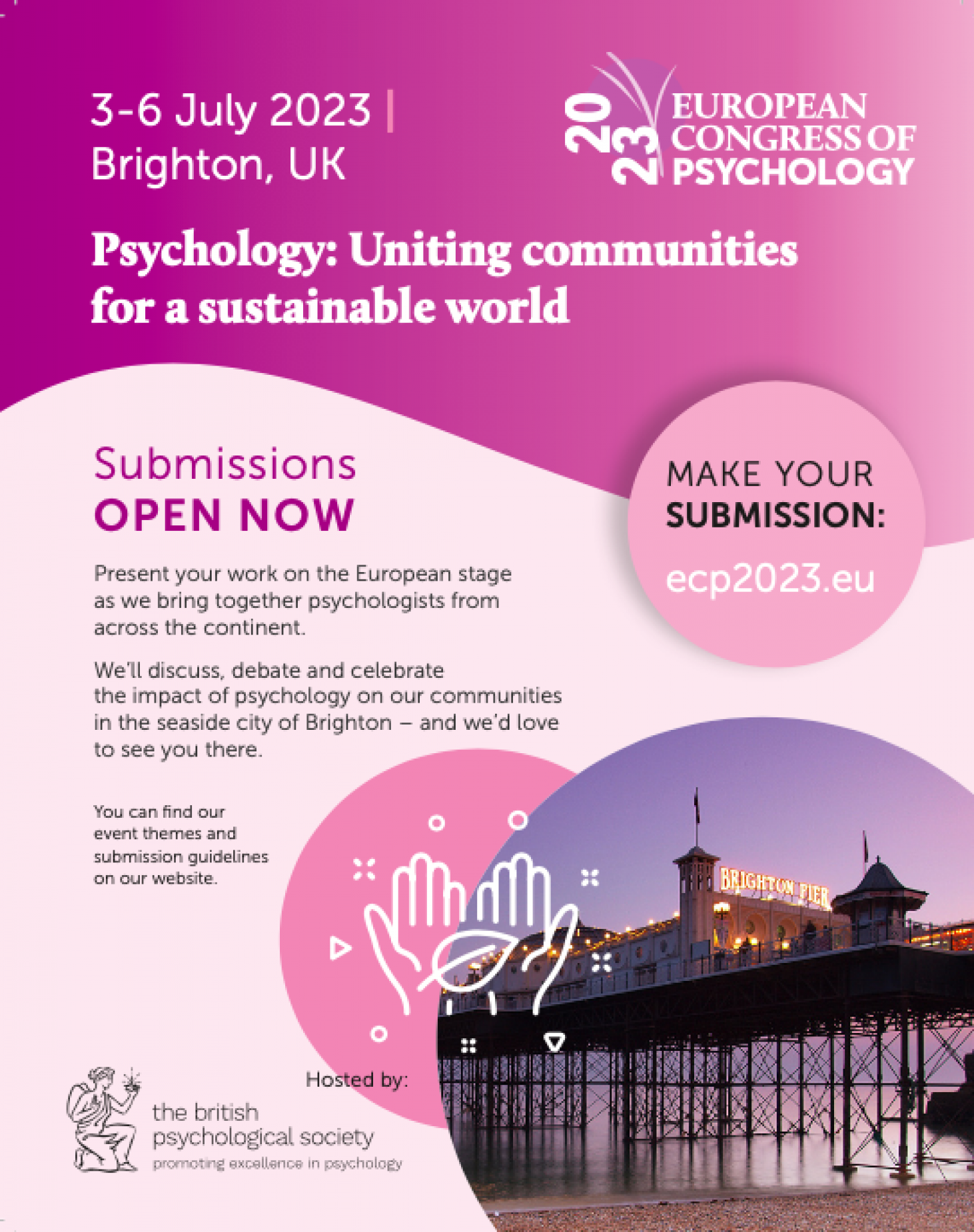
Follow us on
facebook
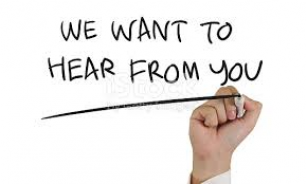
(1)_w1700_h406_1.png)
-
